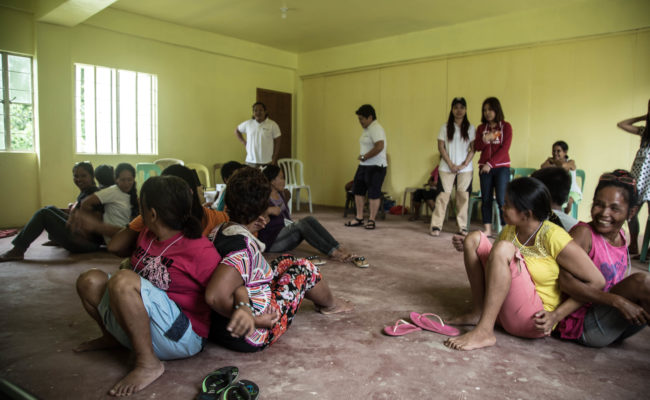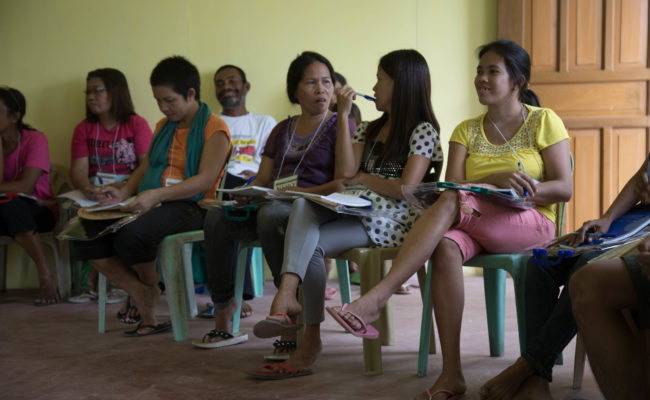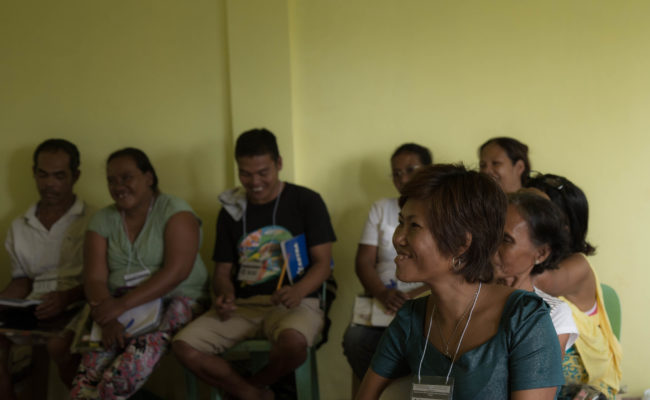In early November the EMBRACE MNCH (maternal, newborn and child health) team travelled overland and sea to facilitate the last of the gender sensitive trainings for the barangays selected this year.
Situated on the entrance to the Pacific Ocean, the far-flung island barangay of Sumaoy has the highest rates of underweight children out of all the barangays receiving assistance for this year – and is filled with keen citizens looking to learn more about combatting this dire problem within their communities.

Meeting in the evacuation center for the island forty health leaders and community heads came together to learn ways to address the stereotypes within their own village. The training facilitated by the MNCH team centered on leadership, team-building and listening skills, as well as education around gender sensitivity. The aim was to break down harmful misconceptions, and find ways to nurture more understanding environments and is a key part of the early work being done on the ground in the province of Camarines Sur.
At only thirty-eight Ivy is both a mother and a grandmother in her community – as well as being a parent leader in the community since 2009. She reflected on the trainings, sharing that she had learned a lot over the day – including skills that she intends to bring back to her family and young grandchild.
“I’m really happy to learn and be a part of this group, especially now that I have a child with a young grandchild. […] I think I can apply the knowledge learnt today in both my parent groups and as a leader in my family as a mother and grandmother.”

In result, it is one of the ways to address the impediments to the way that those who are pregnant within the community access care. There are multiple barriers to how care is accessed amongst women who are pregnant in the region. One of the first steps to addressing this is breaking down the way that gender is perceived within project communities.
Nhes – a Barangay Nutrition Scholar in Sumaoy – is on the front line of the fight against malnutrition on the island. In her job day to day she is involved with weighing children, deworming, providing vitamins and monitoring of the overall health and nutrition amongst the youngest in the village.
She explained that she feels better prepared now, and more self-confident in her ability to carry out her work. Nhes even remarked that she may have held biases that she has never even thought about when it comes to gender. “It’s important for a facilitator to be gender sensitive, to be aware of the feelings of those of the other gender.”

One of the several men in attendance, Benal San Gabriel is a barangay captain and noted that he was keen to bring the skills he learnt back to his family. “I can see this training being helpful because it will empower me as a public servant in the community, and I can share it with my family and neighbours.”
As one of the MNCH Officers facilitating the training on Wednesday, Glaiza Fabelllon reflected on the fact that this training had been needed within the community. “It’s quite new to them, especially the gender sensitive part, as I observed they are not really aware of the small ways we can disregard other genders.”
The trainings conclude an important building block toward achieving the goals of the EMBRACE project. Creating the space for independent learning within the communities facing these health barrier, and passing along important tools for the next stage of growth of the projects on the ground.

